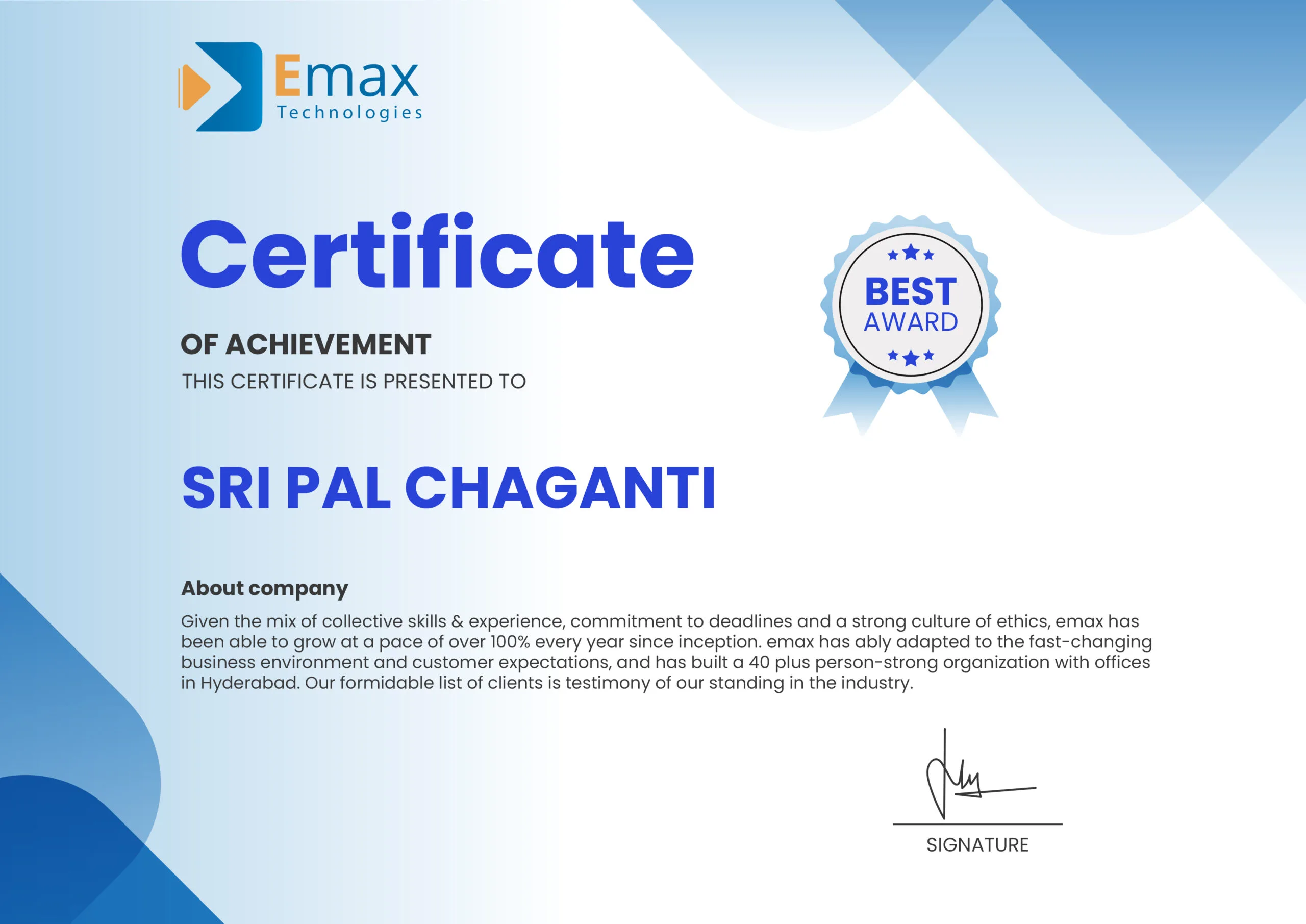Home > Courses > Technical > ABAP
ABAP TRAINING IN HYDERABAD
Course Duration : 90days
Course Level : Beginner

KALYAN REDDY
Sr. SAP ABAP Consultantt
16+ Years of Experience
About the Course
ABAP technology serves as the enduring and stable foundation for SAP’s array of solutions. Its track record of reliability, scalability, and adaptability positions it as the preferred platform for managing critical business operations. ABAP technology underpins SAP’s time-tested Business Suite, the flagship SAP S/4HANA solution, and upcoming innovations like the next-generation data warehouse, SAP BW4/HANA. Additionally, ABAP technology is accessible as an independent platform for creating contemporary ABAP-based business applications tailored to specific needs. SAP’s loyal customer base and partners have a rich history of crafting customized code and extensions that seamlessly operate within the ABAP technology framework.
Description
WHAT ARE THE COURSE OBJECTIVES?
ABAP does not exist in isolation; it is deeply integrated with various elements of the SAP NetWeaver ABAP application server. These elements include:
- ABAP Workbench: The SAP ABAP Workbench comprises a suite of tools designed to generate components for SAP applications. Key components of the workbench include the ABAP Editor, ABAP Dictionary, Screen Painter, Menu Painter, Function Builder, Form Painter, Message Class Builder, and more.
- Open SQL: Open SQL is an abstraction layer for SQL syntax integrated into the ABAP language. The ABAP runtime environment converts Open SQL statements into native SQL statements that are compatible with the specific database system in use.
- Internal Tables: Internal Tables serve as containers for collections of objects. These objects are accessed using specialized language keywords or Open SQL. This concept in ABAP differs from the notion of typed arrays commonly found in languages like Java or C++.
In summary, ABAP is tightly woven into the SAP NetWeaver ABAP application server ecosystem, where it collaborates seamlessly with tools in the ABAP Workbench, employs Open SQL for database interactions, and utilizes Internal Tables for structured data storage. This contrasts with the concept of typed arrays found in languages such as Java or C++.
WHAT ARE THE ROLES AND RESPONSIBILITIES AND METHODOLOGY OF THIS MODULE?
- Act as the technical expert, ensuring quick turnaround in identifying application issues and providing timely solutions.
- Understand the requirements from provided functional designs and transform these requirements into the technical designs
- Develop detailed plans and accurate estimates for completion of build, system testing and implementation phases of project.
- Transform business function requirements into technical program specs to code, test and debug programs.
- Develop code, document and execute unit tests, systems, integration and acceptance tests and testing tools for functions of high complexity.
- Perform performance tuning to improve performance over multiple functions
- Engage other technical team members in the design, delivery, and deployment of solutions.
- Close communication with functional teams /designers and build professional relationships with clients
Ensure integration system activities including monitoring the technical architecture (particularly scalability, availability and archiving) meet all SLA’s. - Manage operational support, performing work during change windows as well as providing on call support as required by the team.
- Undertake performance tuning activities for SAP integration activities.
WHO SHOULD GO FOR THIS TRAINING
Any graduate can learn this course,if he/she knows other programming languages like c,c++ are added advantage but not mandatory.
WHAT ARE THE SKILLS THAT YOU WILL BE LEARNING WITH THIS COURSE?
After completion of SAP ABAP course you will be able to:
- Learn the basic concepts of ABAP Programing
- Good knowledge on dictonary, reports, bdc’s
- Advanced abap topics like sap enhancements and ooabap
- Apply realtime training with end to end implement process
WHAT ARE THE PREREQUISITES TO LEARN THIS COURSE?
SAP ABAP is totally technical if you have an interest in coding and you are strong in logical skills then only you try to switch over.
If you know the following things you feel ABAP easy :
- Programming skills.
- Knowledge of Structured Query Language (SQL) and Relational Database Management will be advantageous.
- You should know the basics of programming, like C programming.
- Object-oriented programming concepts ( OOPs) is that you should know very well to excel in SAP ABAP.
Key Features
Instructor-Led Sessions
50 Hours of Online Live Instructor-Led Classes. Weekend Classes: 24 sessions of 2 hours each. Weekday Classes: 50 sessions of 1 hour each.
Real-Life Case Studies
Live project based on any of the selected use cases, involving implementation of the various concepts.
Assignments
Each class will be followed by practical assignments.
Lifetime Access
You get lifetime access to LMS where presentations, quizzes, installation guide & class recordings.
24 X 7 Expert Support
We have 24×7 online support team to resolve all your technical queries, through ticket based tracking system, for the lifetime.
Certification
After completing your final course project successfully emax will provide you certificate as a SAP Trainee.
Curriculum
1. ERPS
- Introduction to ERP & ERP Products
- List of ERP Products
- Merits Of ERP Products
- SAP as One of the ERP Product
2. SAP R/3 IN DETAIL
- History of SAP R/3
- R/3 Architecture in Detail
- SAP R/3 Versions
- Merits of SAP R/3
- New Dimensional Products
- Sap Logon
3. ABAP & ABAPER ROLE
- Introduction
- Roles Of ABAPper
- ABAP Syntax
- ABAP Data Types
- Variables, Key words, Operators
4. BASIC ABAP PROGRAMMING
- Variables
- Parameters
- System Variables
5. CONTROLLING TECHNIQUES
- Branching
- Looping
6. STRINGS IN DETAILS
7. ABAP (DATA DICTIONARY)
- Introduction and Purpose
- Tables
- Data Elements and Domains
- Handling Currency and Quantity Fields
- Foreign Key Relationship
- Views
- Search Helps
- Types of Tables
8. INTERNAL TABLES
- Introduction and Purpose
- Types of Internal Tables
- Operations on Internal Tables
- Miscellaneous
9. OPEN SQL IN DETAIL
9.1 Introduction ,Reading and Changing Database
10. MODULARIZATION TECHNIQUES
- Introduction and Advantages
- Function Modules
- Subroutines
- Macros and Include Programs
11. REPORTS
- Introduction and Purpose
- Types of Reports
- Classical Events in Details
- Interactive Events in Details
- Conversion Exits
- Joins
For all entries
12. BATCH DATA COMMUNICATION (BDC)
- Overview of BDC
- Types of BDC Programming
- Call Transaction in Detail
- Session Method in Detail
12.6 Recording in BDC Programming
13. LSMW IN DETAIL
14. SAP SCRIPTS
- Introduction and purpose
- SAP SCRIPT Components (Objects)
- Custom Forms
- Single and many Forms
15. SMART FORMS
- Features of Smartforms
- Main, Secondary, Copy and Final Windows
- Types Of Text elements
- Table Painter
- Calculations in table Painte
- Program Lines
16. TRANSACTION / DIALOG (MODULE POOL) PROGRAMMING
- Introduction and Purpose
- Screen Painter, Menu Painter
- Flow Logic and Flow Logic Key words
- Sub Screens and Sub screen Areas
- Tab strip Controls
- Table Control
Advanced ABAP 1 – Object Oriented ABAP
1. WHAT IS OBJECT ORIENTATION
1.1 Introduction
1.2 Advantages of OOPs
1.3 Data Abstraction
1.4 Encapsulation
1.5 Inheritance
1.6 Polymorphism
2. FORM FUNCTION GROUPS TO CLASSES
3. OBJECT ORIENTED CONCEPTS IN DETAIL
Types of Classes and Methods
Define and Implement
Global Classes and Methods
Local Classes and Methods
Constructor
Visibility Sections
4. OOPS APPLICATION - BDC PROGRAMMING
- Develop a Common Global Class for BDC
- BDC Program Using BDC Class
- The Same class and Program through Local classes
5. INHERITANCE
- Global Class for Session method from Common BDC Class
- BDC Program
- Inheritance Using Local & Global Classes
6. POLYMORPHISM
- Interfaces – Polymorphism
- Defining and Implementing
- Global Interfaces
Local Interfaces
7. EVENTS
- Defining, Triggering (Rasing)
- Handling
8. ALV
- ALV using Function Modules
- Classical ALV
- Interactive ALV
- Blocked ALV
- Hierarchical ALV
- Field Catalog
- ALV using Objects Oriented
- Simple ALV
- Interactive ALV
- Adding Custom Functionalities (Buttons)
- Changing,Enhancing Standard Functionality
- Coloring Rows, Columns and Cells
- Exceptions ALV
9. ENHANCEMENTS & ENHANCEMENT SPOTS
CUSTOMER /USER EXITS
LOCATING EXITS
- Implementing Exit
- Function Module Exists
- Screen Exit
- Menu Exits
- BADIs in Detail
- Features of BDIs
- Differences between Exits and BDIs
- Implementation BADIs Function BADIs Screen BADIs Manu BADIs
- Defining and implementing Custom BADIs
- Enhancement SPOTs
- Implict , Explict SPOTs Function Group Enhancement Class Enhancements
- Pre-Exit, Post-Exit, Overwite
Advanced ABAP II – Cross Application concepts
11. BAPIS IN DETAIL
- Introduction to BOR and BAPIs
- Standard BAPIs
- Custom BAPIs
- BAPI Enhancements
12. ALE IN DETAIL
Application Link & Enabling (ALE) and IDOCs
- Introduction to ALE Technology
- IDOCs in Detail
- IDOC Design Guidelines
- IDOC Runtime Components
- Outbound /IDOC Generation Process
- Inbound /IDoc posting Process
- ALE Communication Settings
- Logical Systems
- RFC Destinations
- Port Definition
- Distributing Master Data through Standard IDoc
- Send Whole Copy
- Change Pointers
- Get/Fetch/pull whole Copy Every time
- Filtering
IDOC FILTERING
- Segment Filtering
- Reduced message Type
- Distributing the Transactional data
- Message Control Technique
- ALE Troubleshooting & Recovery
- Outbound & Inbound Process
- Custom IDOCs Development and Programming
- Creating a New IDOC
- Configure Outbound Process
- Configure Inbound process
- Writing Outbound Program
- Writing Inbound program
- Distributing Data through custom IDOC
za.s extended IDOCs Development and Programming
- Creating Extended IDOc
- Configure the Outbound Process
- Configure the Inbound Process
- Outbound Programs for Extended Idocs
- Inbound Programs For Extend I Docs
Distributing data through Extended IDocs
13. ELECTRONIC DATA INTERCHANGE (EDI)
13.I Overview of EDI
15. BDC TABLE CONTROL
16. STANDARD SCRIPTS & SMART FORMS
17. HANDLING FILES
ABAP Project
IMPORTANCE OF ABAP PROJECT
- Importance Of ABAP Project
- Types Of SAP Projects
- Role Of ABAPer In Each Type Of Project
- Naming Standards in the Project
- Coding Standards in the Project
- List of Documents Used In the Project
- TS/TDD
- FS/FDD
- UTP
- Issue Logs
How to Prepare the above Documents
- Code Inspector & EPC, Code Review
- Objects(FS) Analysys From Basic ABAP Concepts
- Reports — ALV — FMs & OOPs
- BDC Programming
- SAP SCRIPTs — Both — Standard & Custom
- SMARTFORMS — Both — Standard & Custom
- UI(NIoduIe Pool) Programming
- Objects(FS) Analysys From ADVANCED ABAP Concepts
- BAPIs
- User Exits
- BADIs
- Enhancement SPOTs — Implict & Explict
- Object Oriented ABAP
- ALE — Idocs
Standard IDocs Custom IDocs Extended Idocs
- Tickets/Tokens Resolutions in the Support Project
10 . Resume Preparation & Guidance
Course Certification

- Upgrade your skills and stay current with the industry by completing these professional courses, which also provide certification upon completion.
- Certificates are generated after the completion of course.
- Certificates are globally recognized & they upgrade your programming profile.
Reviews



FAQ's
WHAT IF I MISS A CLASS?
- You will never miss a lecture at Emax You can choose either of the option: View the recorded session of the class available in your LMS.
WHAT IF I HAVE QUERIES AFTER I COMPLETE THIS COURSE?
HOW SOON AFTER SIGNING UP WOULD I GET ACCESS TO THE LEARNING CONTENT?
IS THE COURSE MATERIAL ACCESSIBLE TO THE STUDENTS EVEN AFTER THE COURSE TRAINING IS OVER?

KALYAN REDDY
Sr. SAP ABAP Consultant
16+ Years of Experience

